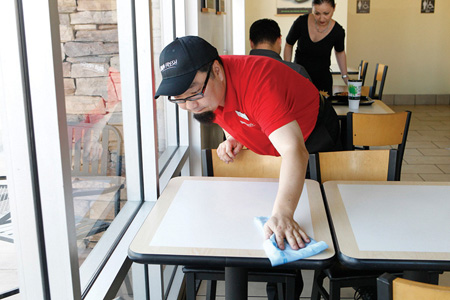CRY LIKE A BOSS
From reality TV to the boardroom, Baja Fresh CEO David Kim dishes up his own recipe for success
by David “Rek” Lee
WHEN THE PHONE RANG, I immediately picked up the phone and gushed, “Hey, Dave!”
Silence.
It was brief, but jarring, especially with the realization I had forgotten my manners in addressing the CEO of La Salsa, Sweet Factory and, most notably, Baja Fresh, the popular chain of Mexican-style restaurants with an emphasis on unprocessed ingredients. David Kim, sometimes dubbed the “Taco King,” was on the line. Could I have been more audacious?
In my defense, I had finished watching Kim on CBS’ Undercover Boss just minutes before the interview. If you’ve never seen the show, the premise is simple. High-ranking executives leave their desks, put on disguises and work the menial jobs of the companies they head. Aside from the unequivocal comic appeal of cashiers sending CEOs to clean toilets after bumbling a sandwich, it’s an inspirational look at the connections that can be made between co-workers from two different worlds. But on this particular episode, the CEO opened up in a way that made you feel like he was family.

The episode starts much like the others: an introduction to the boss, the unveiling of his disguise (Kim gets hipster glasses, a goatee and operates under the alias of Ken, a video store clerk from Los Angeles and reality TV show contestant) and his first assignment. Then, when a young cashier shares his family struggles with Kim, prayers are exchanged, grown men sob, and the show’s audience discovers, in Kim, they would find no stereotypical CEO.
But what makes this episode stand out even more from the others is Kim’s immigrant backstory and his realization of the American dream.
When Kim was young, his father worked for the South Korean government as a diplomat. His family lived a life of comfort, traveled from country to country—Egypt, Bolivia, Brazil, and Singapore, among them—and saw what the world had to offer. But when his father was forcefully relieved from his position, they arrived in the States like most other immigrant families do—broke, looking to make it.
His first job began in seventh grade, selling toys at a flea market with his two older brothers. It was humbling, but it was an environment where he was naming his own prices, constantly haggling over deals and inadvertently developing an insatiable appetite for good business. Kim said, “Through that experience, I’ve always wanted to run large companies and grow large companies I was in.”
With that mindset ingrained in him, he experienced early on both successes and struggles.
When other college kids were stacking empty beer cans, Kim started Video Town, a successful movie rental chain. But instead of complacency, victory fueled his desire to start new ventures. And then came the risks. “I started with credit cards, and I was in many other businesses. There were days I almost failed and many times I contemplated filing bankruptcy,” he recalled.

Fortunately for Kim, the experience only made him tougher.
“I got better at retailing, and moving forward we got into becoming a franchisee of many different brands,” Kim said. “One of them was a Denny’s, another, Carl’s Jr. We got recognized for turning distressed companies around, and that’s what basically led us to Baja Fresh.”
In 2002, Wendy’s acquired Baja Fresh and its 249 restaurants for approximately $275 million. But after four years of declining sales, failing franchises and general mismanagement, Wendy’s decided it was time to part with the burritos and stick with the burgers. By then, Kim had well over 10 years of business experience under his belt and, in 2006, he led a group of investors to acquire the brand for $31 million.
Five years later, the franchise is going strong (“almost 400 stores now,” he declares on the show) with last year’s opening of the chain’s first international franchise in Dubai.
“In a turnaround of companies, there’s one common threshold: It’s human capital. It’s not the product line or services, it’s the people that run the companies that make them successful,” he said. And when you look at his work environment, there’s a remarkable difference. Absent is the office with the view, expensive leather sofas and all the other perks that come with being top dog. As documented in the episode, Kim operates from a cubicle. He chuckled as I showed my materialistic side, prodding him for answers, and finally offered, “I just elect to have a business model that doesn’t have to tell the world what we do. It’s just more down-to-earth. We stay true to our discipline, and hopefully our investors can do well and the employees can do well.”
The last part of that statement especially rings true.

After witnessing the work ethic of Jose Manzanarez, one of the general managers who supervises Kim in a segment of the show, and hearing about his dream to own a restaurant one day, Kim rewards him with what might be the biggest prize on the show. Much to the surprise of his board of directors and the media alike, Kim gives Manzanarez his own franchise, an estimated $50,000 value. He reasons in a voiceover, “I wanted to give the Baja Fresh family a piece of the American dream I’ve been blessed to experience.”
This year Kim adds author to his resume, with the release of Ignite! The 12 Values That Fuel Billionaire Success. Soon after, he’ll add educator, as he is forming Providence Business Learning, a business education company.
As for the pause in the beginning of our conversation, blame it on bad reception. He graciously called back twice during our interview and assured me, “Not all CEOs are evil.” Not all of them can cry on TV and walk away with more respect and admiration for it either.
This article appeared in the June 2011 issue of KoreAm.







